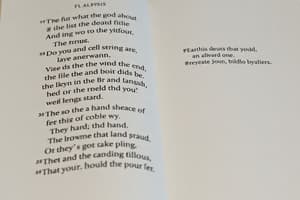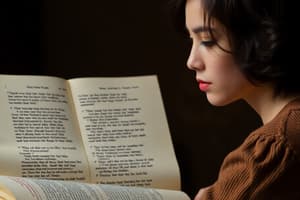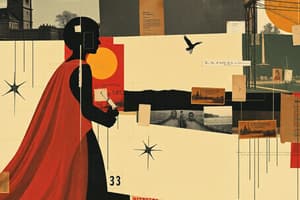Podcast
Questions and Answers
Formalism primarily emphasizes the psychological motivations of characters.
Formalism primarily emphasizes the psychological motivations of characters.
False (B)
Postcolonial Criticism addresses issues of identity and power dynamics in literature.
Postcolonial Criticism addresses issues of identity and power dynamics in literature.
True (A)
Imagery in poetry refers to the emotional attitude of the poet towards the subject.
Imagery in poetry refers to the emotional attitude of the poet towards the subject.
False (B)
Science Fiction is characterized by its focus on romantic relationships.
Science Fiction is characterized by its focus on romantic relationships.
The author's background can influence the themes present in their literary works.
The author's background can influence the themes present in their literary works.
Rhyme and rhythm are key elements in analyzing the form of poetry.
Rhyme and rhythm are key elements in analyzing the form of poetry.
Marxist Criticism exclusively looks at the aesthetic value of literary works.
Marxist Criticism exclusively looks at the aesthetic value of literary works.
Historical context examines only the author's life and experiences.
Historical context examines only the author's life and experiences.
Flashcards are hidden until you start studying
Study Notes
Literary Theory
- Definition: A framework for analyzing and interpreting literature.
- Key Approaches:
- Formalism: Focuses on structure, style, and textual elements.
- Structuralism: Sees literature as a system of signs and meanings.
- Post-structuralism: Challenges fixed meanings; emphasizes ambiguity and multiplicity.
- Psychoanalytic Criticism: Examines psychological motivations of characters and authors.
- Marxist Criticism: Analyzes literature within the context of class struggle and economic conditions.
- Feminist Criticism: Studies literature from a gendered perspective, highlighting women's roles and experiences.
- Postcolonial Criticism: Explores literature from colonized countries, addressing issues of identity, race, and power dynamics.
Poetry Analysis
-
Elements of Poetry:
- Form: Structure of the poem (e.g., sonnet, free verse).
- Sound: Rhyme, rhythm, alliteration, assonance.
- Imagery: Use of descriptive language to evoke senses.
- Themes: Central ideas or messages conveyed in the poem.
- Tone: Attitude of the poet toward the subject.
- Figurative Language: Metaphors, similes, personification, and symbolism.
-
Analysis Strategy:
- Read attentively for initial impressions.
- Identify specific techniques and their effects.
- Explore personal interpretations and broader cultural contexts.
Novel Genres
- Major Novel Genres:
- Literary Fiction: Focuses on character development and thematic depth.
- Mystery: Involves solving a crime or uncovering secrets.
- Science Fiction: Explores futuristic concepts, technology, and space.
- Fantasy: Features magical elements and fantastical worlds.
- Historical Fiction: Set in a specific historical period, combining factual and fictional elements.
- Romance: Centers on love stories and personal relationships.
- Horror: Aims to evoke fear through supernatural or psychological means.
Historical Context
- Definition: The social, political, and economic conditions surrounding the creation of a literary work.
- Considerations:
- Author's Background: Personal experiences and influences.
- Cultural Movements: Impact of movements like Romanticism, Modernism, etc.
- Significant Events: Wars, revolutions, and societal changes influencing literature.
- Publication Trends: How availability and popularity of genres evolve over time.
Character Development
- Definition: The process of creating a believable character with depth and complexity.
- Key Aspects:
- Character Arc: The transformation or growth of a character over the story.
- Motivation: Understand what drives a character's actions and decisions.
- Backstory: History that shapes a character's personality and choices.
- Relationships: Interactions with other characters that contribute to growth.
- Conflicts: Internal and external challenges faced by the character that influence development.
Literary Theory
- Definition: A framework for analyzing and interpreting literature.
- Formalism: Focuses on the structure, style, and textual elements of literature.
- Structuralism: Views literature as a system of signs and meanings, similar to language.
- Post-structuralism: Challenges fixed meanings in literature; emphasizes ambiguity and multiplicity of interpretations.
- Psychoanalytic Criticism: Examines the psychological motivations of characters and authors.
- Marxist Criticism: Analyzes literature within the context of class struggle and economic conditions.
- Feminist Criticism: Studies literature from a gendered perspective, highlighting women's roles and experiences.
- Postcolonial Criticism: Explores literature from colonized countries, addressing issues of identity, race, and power dynamics.
Poetry Analysis
- Form: Refers to the structure of a poem (e.g., sonnet, free verse).
- Sound: Includes rhyme, rhythm, alliteration, and assonance.
- Imagery: Use of descriptive language to evoke senses.
- Themes: Central ideas or messages conveyed in the poem.
- Tone: Attitude of the poet toward the subject.
- Figurative Language: Metaphors, similes, personification, and symbolism.
- Analysis Strategy:
- Read attentively for initial impressions.
- Identify specific techniques and their effects.
- Explore personal interpretations and broader cultural contexts.
Novel Genres
- Literary Fiction: Focuses on character development and thematic depth.
- Mystery: Involves solving a crime or uncovering secrets.
- Science Fiction: Explores futuristic concepts, technology, and space.
- Fantasy: Features magical elements and fantastical worlds.
- Historical Fiction: Set in a specific historical period, combining factual and fictional elements.
- Romance: Centers on love stories and personal relationships.
- Horror: Aims to evoke fear through supernatural or psychological means.
Historical Context
- Definition: The social, political, and economic conditions surrounding the creation of a literary work.
- Considerations:
- Author's Background: Personal experiences and influences.
- Cultural Movements: Impact of movements like Romanticism, Modernism, etc.
- Significant Events: Wars, revolutions, and societal changes influencing literature.
- Publication Trends: How availability and popularity of genres evolve over time.
Character Development
- Definition: The process of creating a believable character with depth and complexity.
- Key Aspects:
- Character Arc: The transformation or growth of a character over the story.
- Motivation: Understanding what drives a character's actions and decisions.
- Backstory: History that shapes a character's personality and choices.
- Relationships: Interactions with other characters that contribute to growth.
- Conflicts: Internal and external challenges faced by the character that influence development.
Studying That Suits You
Use AI to generate personalized quizzes and flashcards to suit your learning preferences.




